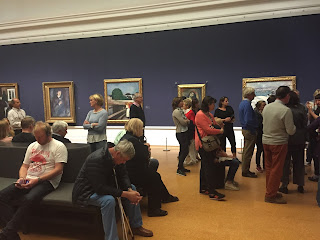The aesthetic
Terry Eagleton: "As artistic production is gradually separated from other kinds of social production in the modern period, the discourse of the aesthetic becomes correspondingly narrow. In the twentieth century, after modernism, it ceased to be a concept of political relevance. In fact, modernism is the last moment when the aesthetic can still be political. After that, the discourse passes into the hands of the academics and the specialists ... It has become a technical concept, but that's not the way it started. The aesthetic began in the broadest possible way as a concept covering the whole of our bodily, sensual life. Indeed, it was not about art at all when it first appeared." (From Eagleton and Beaumont, The Task of the Critic, Verso, 2009, pages 225-226, condensed/reordered)


Comments
Post a Comment